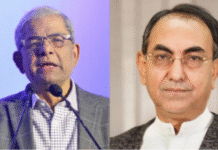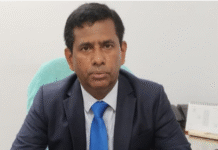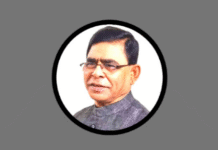Hasina, Modi reaffirm their commitment as the Indian PM joins Bangladesh’s Golden Jubilee and Mujib Borsho celebrations

With Prime Minister Sheikh Hasina and Indian premier Narendra Modi sharing the stage during the celebrations of the country’s golden jubilee of independence yesterday, Bangladesh expressed profound gratitude to India for its support in the Liberation War.
At the National Parade Square, Hasina and Modi paid tribute to the freedom fighters and members of the Indian military who sacrificed their lives to liberate the Bangalees from the occupation forces of the then West Pakistan.
Stating that the two countries have their bond written in blood and share the same values of democracy, Modi and Hasina reaffirmed their commitment to further the unity and work together for the two countries and the entire South Asia.

“For our millions of people, for their future, for our fight against poverty, for the fight against terrorism … our goals are common. Therefore, our efforts should be united,” said Modi.
“We have no time to lose, we must move forward for change, and we cannot delay any further.”
He said the two countries have the power of democracy and a clear vision for moving forward.
“India and Bangladesh moving forward together is equally important for the development of the entire region,” Modi said.
Hasina said Bangladesh always remembers with great respect the immense contribution of India and the Indian people during the Liberation War.
“About one crore people from Bangladesh took shelter in India in 1971 when the Pakistani military murdered and looted the civilians. The Indian government and its people provided them with food and medical treatment. India also trained the freedom fighters and provided arms and helped us diplomatically,” she said.
Final victory was achieved by the joint forces of India and Bangladesh towards the end of the war, she said. A good number of Indian soldiers sacrificed their lives in the war. This contribution of India and its people is unforgettable, she said.
President Abdul Hamid, Bangabandhu’s youngest daughter Sheikh Rehana, Liberation War veterans from Bangladesh and India, MPs, officials and diplomats were present on the last day of the celebrations, which began on March 17.
Yesterday’s theme was “Fifty years of independence and golden line of progress”.
Earlier, The Maldives President Ibrahim Mohamed Solih, Nepal President Bidya Devi Bhandari, Sri Lankan Prime Minister Mahinda Rajapaksa and Bhutanese Prime Minister Lotay Tshering attended the celebrations in person. Global leaders from various parts of the world sent congratulatory messages.
Yesterday’s programme began with the national anthem, followed by recitations from holy books, screening of documentaries on the progress of Bangladesh, defence forces, life and struggle of Bangabandhu, and performances by eminent singers.
Kamal Abdul Naser, chief coordinator of the National Implementation Committee of the event, gave the welcome speech.
Recorded video messages of world leaders, including UN Secretary-General Antonio Gueterres, US President Joe Biden and Russian President Vladimir Putin, were also screened.
Modi then handed over the Gandhi Peace Prize-2020 to Sheikh Rehana. The Indian government gave the award to Bangabandhu Sheikh Mujibur Rahman (posthumously) in recognition of his outstanding contribution to social, economic, and political transformation through non-violent and other Gandhian methods.
Modi, who was the guest of honor at yesterday’s programme, thanked Bangladesh government for inviting him.
He said this was significant also because India and Bangladesh are celebrating 50 years of diplomatic relations. He paid tribute to Bangabandhu, who dedicated his whole life for Bangladesh and its people.
“For us Indians, it is a matter of pride, that we had the opportunity to honour respected Sheikh Mujibur with the Gandhi Peace Prize.”
Modi remembered the hundreds of thousands of sons and daughters of Bangladesh who suffered countless atrocities, shed their blood, and put their lives at stake for their nation, their language, their culture.
He also remembered the brave soldiers of the Indian army who fought in the Liberation War.
“Field Marshal Sam Manekshaw, General Aurora, General Jacob, Lance Naik Albert Ekka, Group Captain Chandan Singh, Captain Mohan Narayan Rao Samant, there are so many brave men such as these, whose stories of leadership and courage continue to inspire us even today.”
He thanked Bangladesh for dedicating a war memorial to honour these brave martyrs in Ashuganj.
Modi said along with many of his friends, he too took part in the Liberation War when he was 20-22 years old. He did satyagraha (a form of passive resistance).
Due to his support for the war, he said he had been arrested and had a taste of life in prison.
“That is to say, there was as much of a longing for Bangladesh’s freedom in India as there was in Bangladesh. The images of the heinous crimes and atrocities committed by the Pakistani army deeply disturbed us and gave us countless sleepless nights.”
Quoting Gobind Haldar, he said, “Those who gave Bangladesh its freedom by shedding oceans of blood, we will not forget them, we will not forget them.”
The world did not talk as much about the cruelty, oppression, and atrocities of Operation Searchlight as it should have, Modi said.
In the midst of all this, Bangabandhu Sheikh Mujibur Rahman was a ray of hope for the people here and for the Indians. Bangabandhu’s courage, his leadership, ensured that no power could keep Bangladesh suppressed.
Under his leadership, common people, the farmers, the youth, the teachers, the workers, came together to form Mukti Bahini. Therefore, Mujib Borsho is also a day to remember his vision, his ideals, and his courage, Modi said.
He said it was a happy coincidence that the 50th anniversary of Bangladesh’s liberation and the milestone of the 75th year of India’s independence arrived together. For both the countries, the journey over the next 25 years would be very important.
Modi said Bangladesh and India have common heritage, common goals, possibilities and common challenges too but “we also face similar threats, such as terrorism”.
“The ideologies and forces behind these inhuman acts are active even today. We not only need to be alert, but also need to stay united to fight them.”
He said both the countries have demonstrated that with mutual trust and cooperation, solutions could be found for all issues, like the Land Boundary Agreement and cooperation during this pandemic.
“The future of India and Bangladesh is just waiting for countless such moments full of goodwill and mutual trust.”
He stressed on better connections between the young men and women of the countries. Modi invited 50 young entrepreneurs to India to mark the 50th anniversary of India-Bangladesh relations and to connect with their startups and innovation ecosystems and meet venture capitalists for an exchange of learnings.
He also announced Subarno Jayanti scholarships for the young men and women of Bangladesh.
Modi said he was pleased that Bangladesh was showing its dynamism to the world under Prime Minister Hasina’s leadership, proving wrong those who had objected to the creation of Bangladesh, looked down upon the people of Bangladesh as inferior, and those who had apprehended the existence of Bangladesh.
Hasina paid tribute to the three million martyrs, the women violated in 1971. She thanked Modi for gracing the occasion, honoring Bangabandhu by the Gandhi Peace Prize and arranging Bapu-Bangabandhu Digital Museum, and the gifts of 109 ambulances and Covid-19 vaccines.
She said India always stands by Bangladesh, whatever political party is in power.
Recalling the horrors of 1975, when Bangabandhu and most of his family members were assassinated, Hasina said she and her sister Sheikh Rehana were then in Germany.
Subsequently, India had sheltered them until they returned to Bangladesh in 1981.
“The assassins wanted Bangladesh to be devoid of ideologies. No nation can achieve anything without an ideology,” Hasina said.
The Awami League eventually gathered strength and assumed power after 21 years and honored 225 Indian leaders and citizens.
“Now, our relationship with India has reached a new height,” she said, adding that cooperation on vaccine, trade, agriculture, connectivity has strengthened.
Hasina said Bangabandhu believed in regional cooperation and mutual trust. A strong South Asia is possible if India, the major regional power, comes forward. The region is the most-densely populated in the world but also has immense potentials.
She said Bangladesh aspires to achieve the SDGs by 2030 and become a developed nation by 2041.
“At such a joyous moment, let us pledge to forget all the divisions, work for the development of people and establish a prosperous South Asia.”









